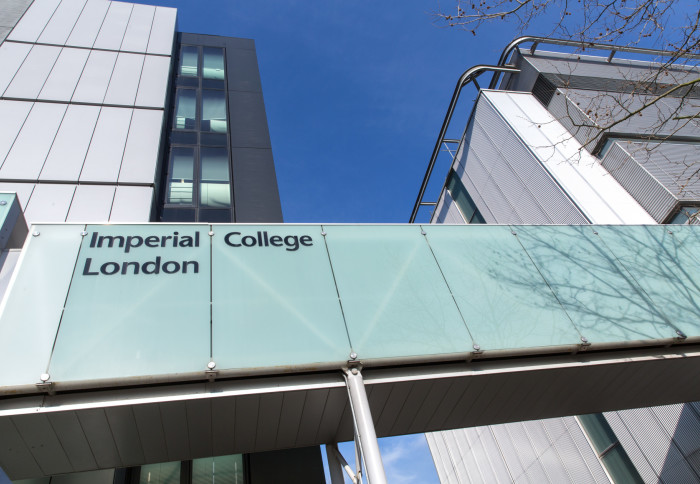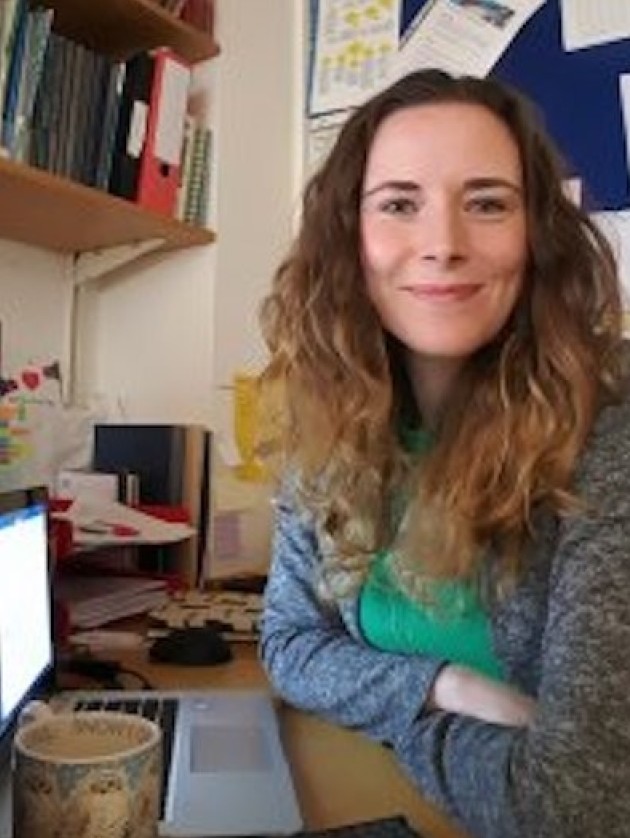MDR researchers celebrated latest round of academic promotions

The Department of Metabolism, Digestion & Reproduction is proud to have seven of its staff recognised in the latest round of Academic Promotions.
Congratulations to Aylin Hanyaloglu and David MacIntyre who have both been promoted to Professor. Congratulations to Isabel Garcia Perez, Elizabeth Holder, Victoria Male, and Joram Posma who have all been promoted to Senior Lecturer. And, finally, congratulations to Richard Smith who has been promoted to Professor of Practice.
Speaking about the promotions, Head of the Department of Metabolism, Digestion and Reproduction, Professor Mark Thursz said: "Congratulations to all my promoted colleagues. You are all deserving recipients of promotions, and I thank you for your continued hard work and commitment to the Department. I am also extremely proud that MDR continues to grow the number of senior female academics in the Department."
We spoke with some of the newly promoted researchers below.
Aylin Hanyaloglu -
Professor in Molecular Medicine
 My academic training and career path has taken me across an unplanned journey across three continents. But this has enabled me to meet and work with many different people in diverse working environments. I am from London originally and completed by BSc in Human Biology at King's College London, and although I started my PhD at the MRC Human Reproductive Sciences Unit at Edinburgh University, a move by my supervisor to sunny Perth, Australia during my second year meant I completed and graduated from the University of Western Australia. I then moved to San Francisco for my postdoctoral training at UCSF and was there for 5 years. Although the song is true about that city, a fantastic opportunity arose in the IRDB for a Lectureship and so I moved back to London to start my independent group at Imperial. I have been here now for a very happy 15 years.
My academic training and career path has taken me across an unplanned journey across three continents. But this has enabled me to meet and work with many different people in diverse working environments. I am from London originally and completed by BSc in Human Biology at King's College London, and although I started my PhD at the MRC Human Reproductive Sciences Unit at Edinburgh University, a move by my supervisor to sunny Perth, Australia during my second year meant I completed and graduated from the University of Western Australia. I then moved to San Francisco for my postdoctoral training at UCSF and was there for 5 years. Although the song is true about that city, a fantastic opportunity arose in the IRDB for a Lectureship and so I moved back to London to start my independent group at Imperial. I have been here now for a very happy 15 years.
My group focuses on fundamental mechanisms directing the activity of a superfamily of signalling receptors, the G protein-coupled receptors, which are central to most biological systems and in many diseases. So GPCRs are targets for a number of successful drugs. There are a lot of exciting developments in the group recently, which are really highlighting that the intricate molecular regulation of these receptors has a big impact on cell signalling, providing us with critical new models in disease and therapeutic targets.
The promotions process provides a wonderful opportunity to reflect on your whole academic journey. Everything I have done, achieved, including learning from mistakes, would never have been possible without all the talented, generous and supportive individuals I have been lucky to work with. So, I feel very proud about this promotion, mostly for my talented team past and present, and thankful for the many collaborators both at Imperial and globally, amazing colleagues in MDR, and without a doubt the support of my family.
David MacIntyre -
Professor in Reproductive Systems Medicine
 I completed my PhD in Reproductive Medicine at the University of Newcastle (Australia) where I worked on applying protein profiling methods to better understand how the human uterus contracts at the time of labour. I then moved to Spain where I was awarded a Marie Curie Fellowship to work on chemical profiling techniques on human biofluids (e.g. urine and blood). At the time, Imperial College researchers were (and continue to be) world leading experts in this area. A post-doc position offered to me in 2010 by Prof. Phil Bennett at the Institute of Reproductive and Developmental Biology was therefore a wonderful opportunity to combine my interests in pregnancy research and systems biology at this world-leading institution. In 2013, I was fortunate to be awarded an MRC Career Development Award, which offered a clear path to independence. Soon after, I was promoted to Lecturer and started to form my own research group, which to this day focuses on trying to understand how the diverse roles of microbes in the reproductive tract can shape women’s health outcomes (e.g. preterm birth, miscarriage, fertility and cervical cancer). Since 2018 I have held the role of Scientific Director of the March of Dimes European Prematurity Research Centre at Imperial, which brings cross-Faculty clinical and scientific experts together to tackle the problem of infection-associated preterm birth.
I completed my PhD in Reproductive Medicine at the University of Newcastle (Australia) where I worked on applying protein profiling methods to better understand how the human uterus contracts at the time of labour. I then moved to Spain where I was awarded a Marie Curie Fellowship to work on chemical profiling techniques on human biofluids (e.g. urine and blood). At the time, Imperial College researchers were (and continue to be) world leading experts in this area. A post-doc position offered to me in 2010 by Prof. Phil Bennett at the Institute of Reproductive and Developmental Biology was therefore a wonderful opportunity to combine my interests in pregnancy research and systems biology at this world-leading institution. In 2013, I was fortunate to be awarded an MRC Career Development Award, which offered a clear path to independence. Soon after, I was promoted to Lecturer and started to form my own research group, which to this day focuses on trying to understand how the diverse roles of microbes in the reproductive tract can shape women’s health outcomes (e.g. preterm birth, miscarriage, fertility and cervical cancer). Since 2018 I have held the role of Scientific Director of the March of Dimes European Prematurity Research Centre at Imperial, which brings cross-Faculty clinical and scientific experts together to tackle the problem of infection-associated preterm birth.
My team are always working on exciting projects but currently I’m really enthused by our recent discoveries implicating specific bacterial species with risk of major obstetric complications such as preterm birth and miscarriage. By working with fantastic collaborators across Departments and Faculties we are now closer to understanding which microbes can cause reproductive tract infection, which can help prevent it, and more importantly, how they do it. We are using this type of information to develop better diagnostic tools and treatment options which ultimately, I hope will improve health for women and babies.
I feel great about the promotion! It has provided me with a real sense of achievement, satisfaction, and justification for all the effort that we as a team have put into this important research. I am forever grateful to my students, colleagues, collaborators, funders and especially my family for the support they continue to provide. Looking forward, I hope to repay their belief in me by supporting the next generation of Women’s health researchers here at Imperial and beyond.
Beth Holder -
Senior Lecturer in Maternal and Fetal Health
 My background is in placental biology, extracellular vesicles and reproductive immunology. I completed my PhD at Manchester University, with a year spent at Yale. After completing two postdocs in paediatric immunology at KCL and Imperial, I returned to my passion for pregnancy research, joining the IRDB in 2019.
My background is in placental biology, extracellular vesicles and reproductive immunology. I completed my PhD at Manchester University, with a year spent at Yale. After completing two postdocs in paediatric immunology at KCL and Imperial, I returned to my passion for pregnancy research, joining the IRDB in 2019.
I have two main research areas: 1) investigating how maternal extracellular vesicles are taken up by the placenta and how this modifies placental function during pregnancy. 2) investigating the mechanism of antibody transfer across the placenta, and the determinants of efficient transfer, through establishment of novel in vitro models of the placental barrier.
I was obviously delighted to be promoted, especially given the challenges of recent years! It’s a testament to the hard work of my research team, and the wonderful support of my peers, admin team, and senior staff.
Victoria Male -
Senior Lecturer in Reproductive Immunology
 The thread that has run through my entire career is a group of immune cells called NK cells. During my PhD in Cambridge, I was looking at how these cells develop in the human uterus during pregnancy. As a post-doc, and later as a Sir Henry Dale Fellow, I went on to look at how NK cells develop in mouse bone marrow, and in human and mouse liver. My appointment at Imperial in 2019 brought me back to looking at the importance of NK cells for human pregnancy, but my lab is now taking a slightly broader view, also looking at how other cells of the innate immune system may be important for the success of human pregnancy.
The thread that has run through my entire career is a group of immune cells called NK cells. During my PhD in Cambridge, I was looking at how these cells develop in the human uterus during pregnancy. As a post-doc, and later as a Sir Henry Dale Fellow, I went on to look at how NK cells develop in mouse bone marrow, and in human and mouse liver. My appointment at Imperial in 2019 brought me back to looking at the importance of NK cells for human pregnancy, but my lab is now taking a slightly broader view, also looking at how other cells of the innate immune system may be important for the success of human pregnancy.
My current research falls into two areas. First, there's my day job, looking at how NK cells in the uterus help the placenta to implant, how this may go wrong in disorders of pregnancy, and what we can do to prevent this. On top of that, I have a number of COVID-19 side projects - although these are increasingly becoming my day job! I am leading a project looking at how the menstrual cycle may impact long COVID symptoms as well as being involved in some large collaborations looking at the effect of COVID-19 vaccination on fertility, the menstrual cycle and pregnancy.
I am delighted with the promotion! The last three years have been very difficult for young labs like mine and we haven't achieved everything we planned to when we set up in 2019. On the other hand, circumstances meant we had the chance to do some important public engagement work, helping people to understand the risks and benefits of COVID-19 vaccination in pregnancy so they could make informed choices.
Isabel Garcia-Perez -
Senior Lecturer in Precision and Systems Medicine
 I have a BSc and MSc degree in Chemistry. Having my PhD in Chemical Sciences, I joined Imperial College London to work as PostDoctoral Researcher on the International Collaborative Study of Macronutrients and Blood Pressure (INTERMAP) Epidemiological study. The award of the PostDoctoral NIHR-Fellowship followed by the Tom West Analytical Fellowship (RSC) and the Wellcome Trust VIP award two years in a row, gave me the opportunity to pursue my research ambitions and contributed to my development as an independent scientist in the field of metabolomics, nutrition and cardiovascular diseases. I was appointed Lecturer in Precision and Systems Medicine in 2017.
I have a BSc and MSc degree in Chemistry. Having my PhD in Chemical Sciences, I joined Imperial College London to work as PostDoctoral Researcher on the International Collaborative Study of Macronutrients and Blood Pressure (INTERMAP) Epidemiological study. The award of the PostDoctoral NIHR-Fellowship followed by the Tom West Analytical Fellowship (RSC) and the Wellcome Trust VIP award two years in a row, gave me the opportunity to pursue my research ambitions and contributed to my development as an independent scientist in the field of metabolomics, nutrition and cardiovascular diseases. I was appointed Lecturer in Precision and Systems Medicine in 2017.
I am passionate about how the diet contributes to the promotion of health. My research mainly focuses on understanding individual’s unique response to diet and developing analytical tools that can contribute to improve the nutritional management at the individual and population level. Currently, I am funded by the National Institute for Health Research (NIHR) to apply in clinic the previously developed urine test, which can give an instant profile of an individual’s diet to personalise dietary advice for people at risk of Cardiovascular Diseases.
The promotion feels pretty good, and I am grateful for all the colleagues and scientists that have worked with me so far. I also feel that my hard work has been recognised by Imperial College and the Department and I will continue working hard because the best is yet to come!
Article text (excluding photos or graphics) © Imperial College London.
Photos and graphics subject to third party copyright used with permission or © Imperial College London.
Reporter
Benjie Coleman
Department of Surgery & Cancer